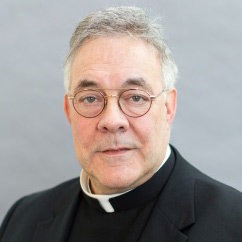The first time I met Fr. James Schall it was around 1984 when I was a seminarian at the Catholic University of America in search of a spiritual director. We met and although Fr. Schall never became my spiritual director, he became an intellectual mentor instead, as well as a dear personal friend and longtime collaborator with the Acton Institute. As might be considered a reward for faithful service, Fr. James V. Schall, S.J., died during Holy Week. I first met Fr. Schall at Georgetown where he had faithfully taught from 1977 until his retirement in 2012. Prior to that he taught at the Gregorian University in Rome and then at the University of San Francisco. In the early 1990s he made time to lead an early Toward a Free and Virtuous Society conference for the Acton Institute, where I recall the ease of his Socratic approach to taking the participants through a reading of Thomas Aquinas’ Treatise on Government. He was a man of towering intellect, with a simple, clear and direct approach. He possessed a wide range of interests and indefatigable energy as is evidenced in the more than 30 books and countless essays and academic articles authored.
The Acton Institute was privileged to be one the many venues of publication that were graced with Fr. Schall’s contributions. Fr. Schall’s Acton published monograph, On Christians and Prosperity, is an excellent example of the generous heart and deeply analytical mind he brought to bear on so many issues throughout his long and fruitful life. For a taste of his thinking on these issues please see his interview on the subject in Religion and Liberty as well as two excerpts from the book ‘The moral dimension of work’ and ‘How do we help the poor?’. Fr. Schall was also an early contributor to the Journal of Markets and Morality and I would commend his article ‘Justice: The Most Terrible of the Virtues’. Fr. Schall possessed the rare gift of being able to capably address a wide range of audiences from the academic to the popular.
Fr. Schall was a man of duty who saw his principal duty as his service to the Lord Jesus Christ,
We should see in duty not just something we “must” do but also something worth doing because it is good. The highest human purposes for which all the orders of economics and politics exist still need to be consciously recognized and articulated. The kingdom of God, as Augustine taught us, is the end of our being. Without it, we will spend our lives searching for it everywhere but where it is.
Fr. Schall’s life and work is an inspiration of how to bring one’s own to service of God and neighbor.

